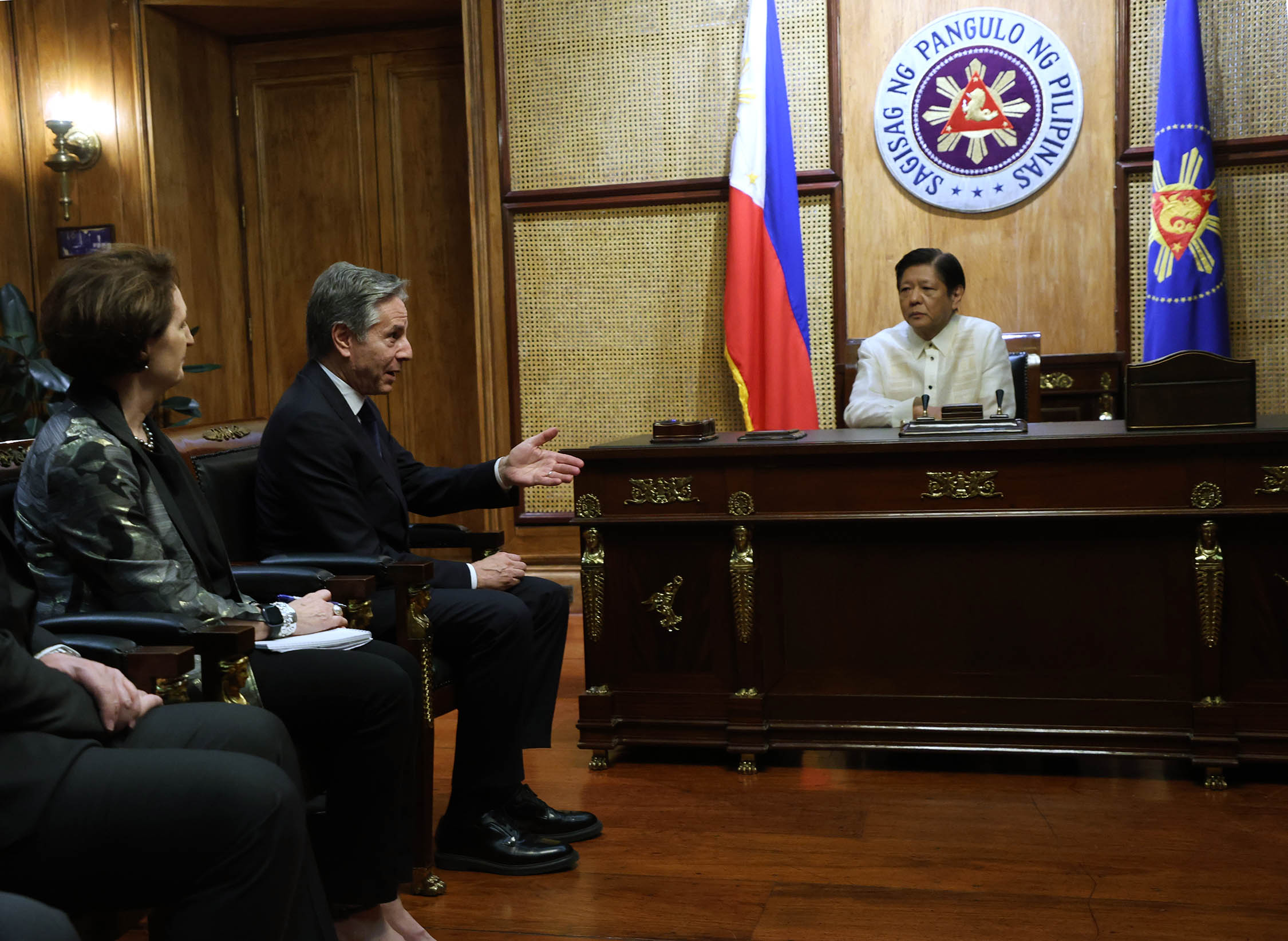
STRENGTHENING TIES US Secretary of State Antony Blinken, accompanied by US Ambassador to the Philippines MaryKay Carlson and other officials, meets with President Marcos in Malacañang on Tuesday as part of his two-day visit that aims to strengthen US-Philippine relations. —MARIANNE BERMUDEZ
Visiting US Secretary of State Antony Blinken said the world had seen the Philippines successfully assert its maritime rights in the South China Sea against Beijing’s “provocative actions.”
In a joint news conference on Tuesday with his counterpart, Foreign Secretary Enrique Manalo, Blinken reaffirmed his government’s “ironclad” commitment under the 1951 Mutual Defense Treaty to defend the Philippines in case of an armed attack on its forces, including the coast guard, “and that will also be anywhere in the South China Sea.”
“I think the Philippines has been extremely successful in pursuing and asserting its rights under the law and we have seen that and the world has seen that. The world has also seen the very actions you described taken by China in violation of international law and (Philippine) rights,” said Blinken, who was in Manila from March 18 to 19.
Blinken’s visit—his second since President Marcos took office in June 2022—is part of a brief Asia tour that also included South Korea.
Blinken’s renewed defense pledge follows recent incidents involving Philippine and Chinese vessels near disputed reefs off the Philippine coast, including collisions.
READ: Blinken, Marcos and Manalo to review US-PH economy, security ties
“These waterways are critical to the Philippines, to its security, to its economy, but they’re also critical to the interests of the region, the United States and the world,” Blinken said at the joint press conference. “That’s why we stand with the Philippines and stand by our ironclad defense commitments, including under the mutual defense treaty.”
Trilateral meet
Blinken’s trip comes ahead of a trilateral meeting in Washington next month between US President Joe Biden, President Marcos and Japanese Prime Minister Fumio Kishida.
Announcing the three-way summit with the Asia-Pacific allies, White House Press Secretary Karine Jean-Pierre said the leaders would push a “shared vision for a free and open Indo-Pacific.”
Biden’s meeting with Mr. Marcos and Kishida at the White House on April 11 is the latest in a series of meetings with Asia-Pacific allies.
Manalo thanked his counterpart for the US government’s “consistent support in regard to recent incidents in the South China Sea in the past year.”
He stressed the Philippines was committed to managing disputes under a rules-based international order and international law, especially the 1982 United Nations Convention on the Law of the Sea (Unclos).
The Philippines in 2016 won a historic arbitral award under Unclos that invalidated China’s sweeping claims in the South China Sea and upheld the Philippines’ exclusive sovereign rights over the portion referred to as the West Philippine Sea.
China, however, has refused to accept the ruling.
“We reaffirmed our shared view that a strong and capable Philippines would make a formidable ally for the United States. On this note, I underscored the importance of more substantial US investments toward enhancing our defense and civilian law enforcement capabilities,” Manalo said.
Easing global tension
In Malacañang, President Marcos on Tuesday said the successive high-profile engagements between the Philippines and the United States, including Blinken’s visit, were only meant to tone down the tension in the international community and improve relations among countries.
“I hope that all these efforts we are making are making some success because it is of great importance to [us too,]” he told Blinken and his delegation, who paid a courtesy visit to the Philippine leader in Malacañang on Tuesday afternoon.
During the call, Blinken confirmed to the President the latter’s upcoming trilateral meeting in Washington.
“I think a new horizon of cooperation is also incredibly promising, but it is also building on the very strong foundation of our countries where we have the same priorities whether it’s economic development, whether it’s dealing with climate change, with food security, of course upholding international law—all these things are front and center [at the end of the day],” he said.
Blinken agreed with earlier pronouncements by Manalo describing US-Philippines relations as “in hyperdrive.”
“That is so true, we see it across every domain, it’s something we attach very great importance to and now we have your upcoming visit to Washington,” he told Mr. Marcos.
Blinken mentioned having discussions with Manalo about “working on a number of challenges around the world,” without citing specifics.
Anti-US sentiment
But not everyone was happy with Blinken’s visit.
The militant labor group Kilusang Mayo Uno (KMU) cautioned Malacañang against capitulating to the interests of Washington and American corporations, saying this would lead only to more lopsided economic policies at the expense of the Filipino people, especially workers.
“There’s no explanation here except that the Marcos administration is bending its knees too much in favor of the interests of the US and its giant corporations, resulting in direr conditions for labor,” KMU secretary general Jerome Adonis said in a statement.
The United States, he said, is currently facing a crisis in its tech industry due to lesser semiconductors and computer chips coming from China.
He warned that US capitalists investing in the Philippines to produce the materials would want to maintain their “super profits” and give Filipino workers low wages.
The labor leader claimed that the ongoing attempts to amend the Constitution’s economic provisions, increased security ties with the United States, the recent trade mission, and US investments were “all nefarious steps to regain favor lost in the last six years of the Duterte regime, and to further entrench the US into Philippine politics, economy and military.” —WITH REPORTS FROM JEROME ANING AND AFP INQ